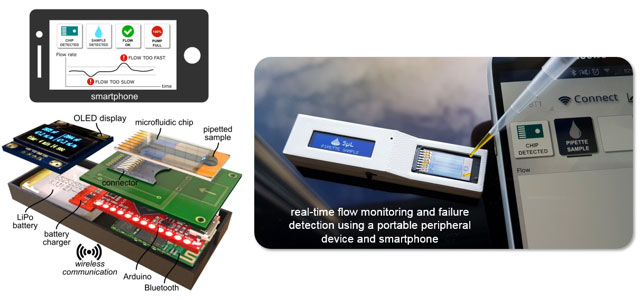SPICE UP YOUR CHIPS WITH ELECTRONIC GADGETS AND ARDUINO
Yuksel Temiz, IBM Research - Zurich, SWITZERLAND
Workshop Description:
Microfluidics and lab-on-a-chip technologies have already proven their benefits for a broad range of applications by reducing the consumption of reagents and samples, shortening the assay time, and increasing the efficiency of a laboratory workflow. Despite these strengths, many new research concepts and prototypes developed for the miniaturization of traditional laboratory assays still rely on bulky peripheral instruments (e.g. microscopes, signal generators, data acquisition systems, pumps, etc.). No matter how small, cheap and sensitive the microfluidic chip is, if it requires expensive, bulky, and difficult to operate setups, its widespread adoption and commercialization potential will be limited, particularly for applications like point-of-care diagnostics and wearables.
In this workshop, I will discuss how to implement simple, portable and connected peripheral devices using Arduino microcontrollers. I will give examples from the literature and present use-cases from our own research (e.g. controlling and monitoring liquid flow in capillary-driven microfluidic systems and Bluetooth communication for wearables). I will also show the implementation of some custom-made lab gadgets (e.g. a pipetting robot, a hacked microscope camera, and more). The workshop will also have a demo session where participants will program their own Arduino boards (will be provided) for sensor readout and wireless communication.
I will try to avoid technical jargon and too much details specific to electrical/computer engineering so that participants from different disciplines (e.g. chemists, biologists, researchers who are interested in supporting their microfluidics and lab-on-a-chip devices with electronic gadgets) can follow easily. The workshop will probably be trivial for experts in programming embedded systems and wireless communication.

Reference: Y. Temiz and E. Delamarche, "Sub-nanoliter, real-time flow monitoring in microfluidic chips using a portable device and smartphone," Scientific Reports 8, 2018
Overview of Material to Be Covered and What Attendees Can Expect to Take Away From the Workshop:
First half: Introduction to Arduino, how to design and program an electronic board, how to write a simple smartphone app, interesting use cases involving microfluidics, sensors, and wearables
Second half: live demos involving the attendees
Participants Will Need the Following:
Preferably a laptop with the latest version of the Arduino IDE (https://www.arduino.cc/en/Main/Software) pre-installed. Participants who cannot bring their laptops are still welcomed, we will form groups and share the available laptops during the demo session.
Yuksel Temiz, IBM Research - Zurich, SWITZERLAND
Workshop Description:
Microfluidics and lab-on-a-chip technologies have already proven their benefits for a broad range of applications by reducing the consumption of reagents and samples, shortening the assay time, and increasing the efficiency of a laboratory workflow. Despite these strengths, many new research concepts and prototypes developed for the miniaturization of traditional laboratory assays still rely on bulky peripheral instruments (e.g. microscopes, signal generators, data acquisition systems, pumps, etc.). No matter how small, cheap and sensitive the microfluidic chip is, if it requires expensive, bulky, and difficult to operate setups, its widespread adoption and commercialization potential will be limited, particularly for applications like point-of-care diagnostics and wearables.
In this workshop, I will discuss how to implement simple, portable and connected peripheral devices using Arduino microcontrollers. I will give examples from the literature and present use-cases from our own research (e.g. controlling and monitoring liquid flow in capillary-driven microfluidic systems and Bluetooth communication for wearables). I will also show the implementation of some custom-made lab gadgets (e.g. a pipetting robot, a hacked microscope camera, and more). The workshop will also have a demo session where participants will program their own Arduino boards (will be provided) for sensor readout and wireless communication.
I will try to avoid technical jargon and too much details specific to electrical/computer engineering so that participants from different disciplines (e.g. chemists, biologists, researchers who are interested in supporting their microfluidics and lab-on-a-chip devices with electronic gadgets) can follow easily. The workshop will probably be trivial for experts in programming embedded systems and wireless communication.

Reference: Y. Temiz and E. Delamarche, "Sub-nanoliter, real-time flow monitoring in microfluidic chips using a portable device and smartphone," Scientific Reports 8, 2018
Overview of Material to Be Covered and What Attendees Can Expect to Take Away From the Workshop:
First half: Introduction to Arduino, how to design and program an electronic board, how to write a simple smartphone app, interesting use cases involving microfluidics, sensors, and wearables
Second half: live demos involving the attendees
Participants Will Need the Following:
Preferably a laptop with the latest version of the Arduino IDE (https://www.arduino.cc/en/Main/Software) pre-installed. Participants who cannot bring their laptops are still welcomed, we will form groups and share the available laptops during the demo session.